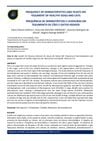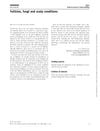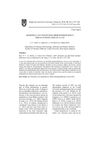7 citations,
December 2021 in “Pharmaceutics” The nanoemulsion with garlic oil, apple cider vinegar, and minoxidil could effectively treat alopecia areata.
 5 citations,
October 2022 in “Phenomics”
5 citations,
October 2022 in “Phenomics” Your skin is like an ecosystem, with its own community of microbes and substances that interact and affect its health.
 3 citations,
April 2022 in “Microorganisms”
3 citations,
April 2022 in “Microorganisms” People with severe hair loss (Alopecia Areata) have different scalp bacteria than healthy people, which might help predict the condition's progress.
 2 citations,
November 2022 in “Bioscience Reports”
2 citations,
November 2022 in “Bioscience Reports” Polycystic ovary syndrome and iron overload share similar symptoms and can be potentially treated with blood removal, diet changes, and probiotics.
 1 citations,
January 2023 in “International Journal of Molecular Sciences”
1 citations,
January 2023 in “International Journal of Molecular Sciences” Understanding how Regulatory T Cells work could help create treatments for certain skin diseases and cancers.
1 citations,
January 2023 in “Chemical Engineering Journal”  May 2023 in “Frontiers in Immunology”
May 2023 in “Frontiers in Immunology” Treg cell-based therapies might help treat hair loss from alopecia areata, but more research is needed to confirm safety and effectiveness.
June 2020 in “Journal of Investigative Dermatology” The symposium highlighted the importance of genetics in understanding and treating complex skin diseases.
1 citations,
August 2022 in “Frontiers in Physiology” Finasteride may help treat kidney disease caused by a high-fat diet by reducing harmful toxins and improving gut bacteria.
 December 2021 in “Revista da Sociedade Portuguesa de Dermatologia e Venereologia”
December 2021 in “Revista da Sociedade Portuguesa de Dermatologia e Venereologia” Imbalance in scalp bacteria can affect hair and scalp health, potentially leading to conditions like hair loss, psoriasis, and dandruff.
 70 citations,
October 2020 in “The journal of allergy and clinical immunology/Journal of allergy and clinical immunology/The journal of allergy and clinical immunology”
70 citations,
October 2020 in “The journal of allergy and clinical immunology/Journal of allergy and clinical immunology/The journal of allergy and clinical immunology” Janus kinase inhibitors are promising drugs for treating autoimmune and inflammatory diseases.
 1 citations,
August 2023 in “Frontiers in immunology”
1 citations,
August 2023 in “Frontiers in immunology” Traditional Chinese medicinal foods may help manage long-term post-COVID symptoms.
 June 2023 in “Deleted Journal”
June 2023 in “Deleted Journal” Healthy dogs and cats can carry and spread skin infections without showing symptoms.
4 citations,
October 2021 in “Microorganisms” Men with androgenetic alopecia have different scalp oils and microbes compared to those without.
 52 citations,
January 2022 in “Current Research in Pharmacology and Drug Discovery”
52 citations,
January 2022 in “Current Research in Pharmacology and Drug Discovery” New treatments for COVID-19 show promise, but more effective antiviral drugs are needed.
18 citations,
July 2016 in “Clinics in dermatology” Nutrition affects skin health differently based on age and condition.
7 citations,
September 2020 in “Bioscience Biotechnology and Biochemistry” The scalp has more diverse bacteria, while hair has more bacteria and unique types.
 93 citations,
April 2012 in “International Journal of Cosmetic Science”
93 citations,
April 2012 in “International Journal of Cosmetic Science” Improving skin barrier and using antifungal treatments can help manage dandruff.
 1 citations,
September 2011 in “British Journal of Dermatology”
1 citations,
September 2011 in “British Journal of Dermatology” Malassezia yeast plays a key role in dandruff and seborrhoeic dermatitis.
 3 citations,
August 2017 in “PubMed”
3 citations,
August 2017 in “PubMed” A man got a scalp infection from synthetic hair implants because the procedure wasn't done by a doctor and was poorly managed.
 May 2020 in “International journal of current microbiology and applied sciences”
May 2020 in “International journal of current microbiology and applied sciences” A Pug with skin issues was successfully treated for mite and bacterial infections.
 April 2017 in “The journal of investigative dermatology/Journal of investigative dermatology”
April 2017 in “The journal of investigative dermatology/Journal of investigative dermatology” Stress in hair follicle cells increases certain immune-related proteins, which might contribute to hair loss conditions.
 13 citations,
August 2020 in “Frontiers in Immunology”
13 citations,
August 2020 in “Frontiers in Immunology” Gamma delta T cells in the skin help with healing and defense but can also cause autoimmune issues, and more research is needed to understand how they are activated.
 3 citations,
January 2019 in “Bulgarian Journal of Veterinary Medicine”
3 citations,
January 2019 in “Bulgarian Journal of Veterinary Medicine” The cat was put to sleep due to recurring infections.
 1 citations,
June 2020 in “bioRxiv (Cold Spring Harbor Laboratory)”
1 citations,
June 2020 in “bioRxiv (Cold Spring Harbor Laboratory)” Fetal skin has unique immune cells different from adult skin.
 1 citations,
April 2018 in “Revista da Sociedade Portuguesa de Dermatologia e Venereologia”
1 citations,
April 2018 in “Revista da Sociedade Portuguesa de Dermatologia e Venereologia” Hidradenitis suppurativa is a chronic skin condition more common in women, linked to genetics and lifestyle factors, and associated with various other health issues.
 January 2021 in “Plant Archives/Plant archives”
January 2021 in “Plant Archives/Plant archives” Dogs with ear infections have a higher rate of yeast infection, especially German Shepherds, with seasonal variations observed.
 155 citations,
May 2016 in “Nature communications”
155 citations,
May 2016 in “Nature communications” Memory T cells in the skin balance staying put and moving into the blood, clustering around hair follicles, and increasing in number after infection.
 44 citations,
March 2020 in “Antibiotics”
44 citations,
March 2020 in “Antibiotics” Rosemary extracts with carnosic acid and carnosol can reduce the harmfulness of Staphylococcus aureus without stopping its growth.
 21 citations,
October 2014 in “Antimicrobial Agents and Chemotherapy”
21 citations,
October 2014 in “Antimicrobial Agents and Chemotherapy” Finasteride effectively prevents biofilm formation and treats preformed biofilms, but requires high doses.






















